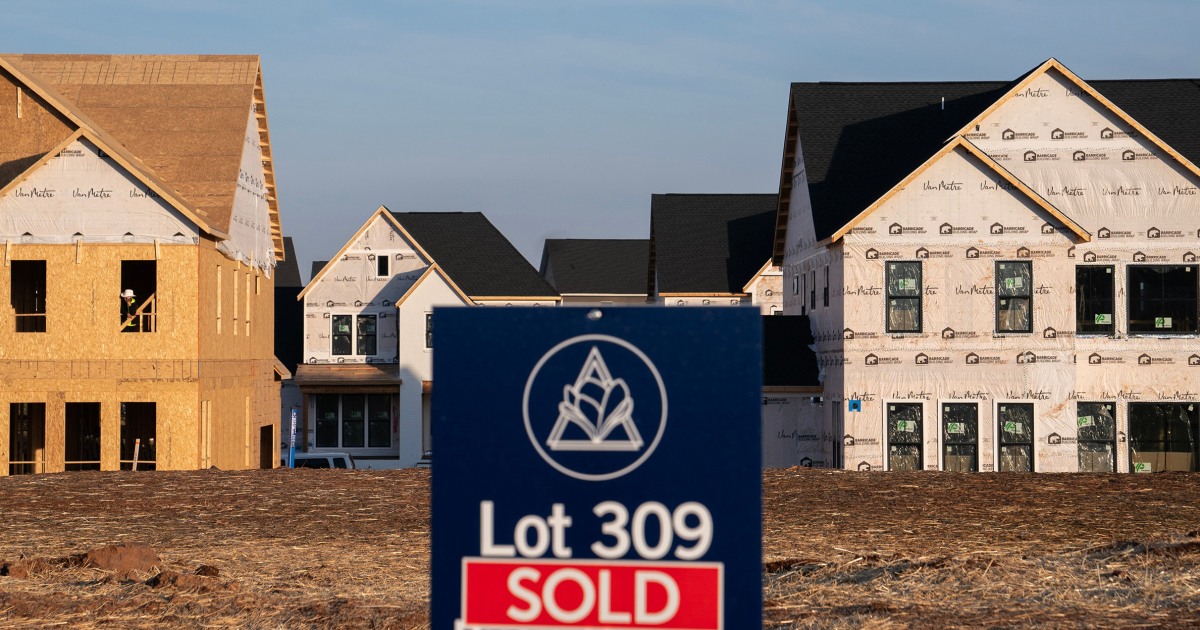The optimism in the residential real estate market is breaking records. But will the bubble burst?
Real estate prices are high and seem to continue to soar. But things can go wrong. As interest rates rise, real estate companies' financing costs rise, mortgages rise, and economic capacity in the industry declines.
We all need to know how to set boundaries and address the red lights, not be tempted to trade beyond our means
Dudi Barel, Yellin Lapidot
13/02/2022
Sunday, 13 February 2022, 17:35 Updated: 18:11
Share on Facebook
Share on WhatsApp
Share on Twitter
Share on Email
Share on general
Comments
Comments
The residential real estate market in Israel is run as if nothing can stop the rise in prices. Demand is rising, prices are soaring and the parties involved are confident, for the most part, that it is not going to change. That the factors that brought them are less relevant to the Israel of 2022.
Is the Israeli narrative (at least in the last twenty years) according to which real estate prices are always rising and will continue to rise really justified?
What will a housing market crisis look like, if any, and what will be its effects on the record-breaking mortgage market?
How will a crisis in the housing market affect young couples, housing developers, entrepreneurs and investors?
It is clear that if this almost imaginary scenario materializes, many people will be harmed and probably also lose money - a great deal of money.
More on Walla!
"Tasting" from Morocco: Where to Find Perfect Local Food Across Morocco?
Walla!
Tourism in collaboration with Pegasus
Construction in the center: Will prices continue to rise? (Photo: Reuven Castro)
Some numbers
At the end of December 2020, the Israel Land Authority (RMI) published the results of the tender for the construction of about 180 housing units in two lots in Ashkelon. In the first lot, the winning company agreed to pay about NIS 21 million for the land, The land was valued at only NIS 3.2 million.
On the second plot (where 108 apartments can be built), the winning company agreed to pay NIS 33 million, while the value of the land was only NIS 9.8 million.
And this is not an isolated case.
In June 2021, the results of a RMI tender were announced for two plots in the Carmei Gat neighborhood of Kiryat Gat, one with 286 housing units and the other with 246 units. The winners agreed to pay NIS 95 million for the first land, which RMI estimated was worth about NIS 57 million, and about NIS 91 million on the second land, which Rami estimates was worth about NIS 39 million. This time, too, the winning bids were tens of percent higher than the assessment.
Another example: In August 2021, the results of the Sde Dov tender in Tel Aviv were published for the construction of 1,574 housing units on an area of approximately 340 dunams in the prestigious land by the sea, in the northwestern part of the city.
The four winning companies agreed to pay about NIS 4.5 billion for the land - that is, the cost of the land alone is about NIS 3 million for each housing unit. Take for example one of the four plots, where the minimum price for land was about 87 million shekels and the buyers agreed to pay about 633 million shekels - 7 times the minimum price! And 2 times the price of the assessment for the land.
The high prices do not characterize only apartments in Tel Aviv.
Even in cities like Lod, Ramat Hasharon, Ashkelon, Yehud, Kiryat Gat and more, where real estate developers recently purchased land at prices tens of percent higher than the prices paid for land in those areas about a year or two ago, and in some cases hundreds of percent higher than the price edited by Ram " Herself.
What Bounces Residential Real Estate Prices?
Apartment prices have not doubled in the last year or two, so why are developers and contractors willing to pay double and more while at the CBS prices have risen "only" by an average of 10% in the last year? The answer is a combination of quite a few factors, including In available land (which leads to great competition in any tender) as a result of slow state marketing, prices continue to rise, low interest rates and the boom in the high-tech industry, which created a significant stratum in the population met with big money, and increased demand in the real estate market, especially in Tel Aviv , But not only.
These factors together have created a growing snowball: everyone - from developers to buyers - not only do not back down from making deals, but on the contrary - they pay dearly in the belief that prices will continue to rise and that selection will only shrink.
In practice this has created a mechanism of betting on the value of the land on the part of the developers, which is based on forecasts of a significant increase in future selling prices.
History has often taught us that assumptions, which are based on expectations of sharp price increases over time, can be problematic in any area, especially when there is also high leverage.
This tune cannot be stopped, everyone says - the contractors, sales people, the media and even government officials, who are supposed to work to lower prices and in practice fuel the continued rise in prices with statements that prices will continue to rise for the next two years.
is that so?
In the current reality of the real estate industry, everyone shares the risk - both developers and buyers who take out huge loans
. And various factors may go wrong and change the overall picture.There is a partial
list.The state will change attitude and start thinking long term.
Real estate project in Be'er Sheva. We are not far from the day when buying an apartment in the center of the country will become impossible (Photo: ShutterStock)
The high prices are not necessarily good for developers and contractors
The largest beneficiary of the sharp price increases is the State of Israel, which has the largest land, which markets them at a slow pace (whether intentional or inefficient) and thus manages to maximize value and enrich the state coffers with high revenues as a result of price increases.
In the short term, price increases are also good for homeowners and real estate companies, especially those who also own land, but it is clear that the market in this situation is not socially and economically healthy
. Facilitate weaker populations in purchasing an apartment such as a target price plan and a occupant price plan.These plans, as soon as they were announced, did manage to create a kind of stagnation in the market, but it lasted for a relatively short time.
The political-economic reality in Israel may change at any moment, which may affect real estate prices, among other things, as a result of a profound change in the state's perception of the required long-term moves, such as a significant increase in housing supply, through massive land and / or market marketing. Urban renewal, significant reduction in bureaucracy, improvement of public transportation infrastructure and incentives for large employers to develop employment complexes in the periphery as well,
etc. Because their risk also goes up.
It is possible that they would have preferred a higher level of certainty and fixed price increases of a few percent per year, over the madness that is now taking place, which causes them to be dependent on further price increases in a market that already today stops breaking records.
If the state so-called "speculates" in land today, and allows housing prices to rise - in the long run and by weighting the social parameters, enormous damage could be done to the Israeli economy.
On the day that buying an apartment becomes impossible for young couples around the main employment areas (and some would say we are not far away), there may be a profound cultural change in the accepted model and we may move from striving to buy an apartment to a fixed rent model.
This change, if it occurs, could severely hurt state revenues in the future from real estate and could hurt homeowners, investors as well as developers and construction companies, who today purchase land for future development in anticipation of sharp price increases each year.
The corona is back?
What would have happened if the corona had continued to rage without vaccines or medicine for a period of years?
What would the real estate market look like if we
had to work from home and social distance in the years to come? Before
Corona
, there was a feeling that technology and advanced medicine had made us immune, that nothing could bring the world economy to its knees, but everyone was wrong and big time.
Severely, it is possible that the city centers would have become less attractive, and this would have greatly affected the demand.
In a model of permanent remote work probably people would have preferred spacious and larger houses, even if in the suburbs, and were no longer willing to settle for a "one-room apartment in the corner" (from Dudu Tessa's poem) over the popular cafe (closed because of the corona).
Proximity to the workplace would have become less substantial and the demand map would have changed, which could have turned into a rolling event that would have hurt funding, entrepreneurs, apartment owners and the economy as a whole.
Dudi Barel, Director of the Companies and Public Corporations Desk at Yellin Lapidot Investment House (Photo: Photo Center) (Photo: Photo Center)
What will happen to demand?
The local real estate sector is thriving, but it is also based on a misconception that investing in it is almost risk-free, and there are those who believe that it has the highest return expectation. , High liquidity and cultural considerations (marrying and then buying an apartment) to factors such as natural population growth (at the rate of the highest in the West), land shortages in areas of demand and slow planning processes and high-tech rich people who poured a lot of cash into the market in a short time.
Some of these reasons have also meant that Israel does not yet have a sufficiently developed market for long-term rental housing, although in recent years more projects have been marketed that also included rental housing.
This happens mainly in highly sought-after areas, where rising prices are forcing young people and housing developers to give up on the dream of buying an apartment and adopt the model that has gained popularity in major cities around the world.
Institutionalizing the rental housing market, and making it a real alternative in the heart of demand areas (but not only), has the potential to adversely affect the demand for owner-occupied dwellings.
These many factors are built like a card tower and there are quite a few scenarios in them, if there is a negative change in one of the dominant characteristics it can lead to a chain reaction that will hurt demand, slow down or stop price increases and make many projects less profitable and may even result in losses At prices that may turn out to be too high.
Possible scenarios include a wave of young people who will no longer be interested in chasing an apartment they own, a high-tech locomotive will be stopped, an unusual security incident (such as a war with Iran), or maybe interest rates will rise significantly?
Financing crisis: The unlimited credit tap will close
Paradoxically, at this time, investors believe that investing in the real estate industry has never been safer, with housing prices at a peak, construction inputs rising significantly, land being sold at imaginary prices after stubborn competition between dozens of developers and contractors, and the public being more leveraged than ever. In terms of mortgages,
especially now the risk margins (reflected in the yield to maturity of the bonds) have almost disappeared and the financing costs of the real estate companies have never been lower.
At current inflation levels and future expectations, it is likely that the expansionary monetary policy will not accompany us for much longer and the rules of the game may change after interest rates in the markets rise.
Although the supply of land available for construction and bureaucratic procedures have a greater impact on housing prices than a slight increase in interest rates but still, a change in the upward direction of interest rates is a scenario worth noting.
As interest rates rise, so do the financing costs of real estate companies (and in general), mortgages rise, and the economic ability of players in the industry to make investments will decline
. The US housing market after the painful bursting of the high-tech bubble in 2000. The main reasons for the market boom then were a sharp drop in interest rates and legislation that made it significantly easier to take out mortgages even by borrowers with highly questionable repayment ability.
In fact, the basis of the problem was poor risk management by American banks (to the point of being ignored), which granted loans to almost every claimant, often even without paying any down payment (equity) on the part of the borrower.
Slowly, many cases of borrowers failing to meet mortgage payments began to emerge and the residential real estate market soon went into a spin, the end of which is known to everyone: the American housing market fell into the abyss and dragged behind it almost the entire financial system.
In contrast, in Israel the level of security of the banks is high compared to the situation in the United States (then and now).
It is clear to everyone that the market is in an unhealthy state of accumulation (Photo: Reuven Castro)
So who can stop the snowball in the residential real estate market?
On the one hand, prices in the short term may continue to rise for known objective reasons: low supply that meets high demand, construction rate not close to even population growth rate, supportive cultural characteristics, low interest rate environment, high-tech boom, etc.
In addition, the expectation of all players for the continuation of the rises produces an inflation of expectations that also feeds the phenomenon.
But on the other hand, it is clear to everyone that the market is in a state of accumulation that is unhealthy over time, and therefore it is necessary to take courageous steps (which may yet happen), first and foremost by the state, but not only by it.
We all need to know how to set boundaries and address the red lights that come on, not be tempted to trade beyond our capacity, even when funding is available and cheap or because we are afraid of missing the train.
If so, questions such as why the state does not change the pace and method of land marketing, whether the mortgage market should be more restrained, whether the state should produce additional risk control mechanisms on the banks and many others are likely to remain open, but one thing is clear, earning is much easier to ignore From the risks, and worse, to forget that sometimes and usually without prior notice, they also materialize.
The writer is the director of the companies and public corporations desk at the Yellin Lapidot Investment House
Of money
Opinions
Tags
Mortgage
Real Estate
Apartments














